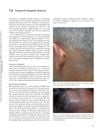 January 2021 in “Erciyes medical journal”
January 2021 in “Erciyes medical journal” The COVID-19 pandemic changed the types of skin conditions seen at a clinic, with fewer patients and varying numbers of specific conditions.

A thorough skin history and examination are essential for diagnosing and treating skin conditions effectively.
[object Object] 2 citations,
January 2019 in “Acta dermato-venereologica” 1 citations,
January 2019 in “PubMed” A woman developed a hair disorder after a bone marrow transplant, which improved with treatment.
4 citations,
December 1994 in “PubMed” A woman’s skin bumps healed almost completely with tretinoin cream after a leg infection.
2 citations,
July 2018 in “PubMed” Low vitamin D levels might cause hair loss that can be treated with vitamin D supplements.
 1 citations,
March 2013 in “PubMed”
1 citations,
March 2013 in “PubMed” The study found that it's hard to tell the difference between two types of hair loss, alopecia areata and telogen effluvium, by looking at symptoms and tissue samples.
 January 2021 in “Indian Journal of Paediatric Dermatology”
January 2021 in “Indian Journal of Paediatric Dermatology” Topical tretinoin 0.025% cream is an effective treatment for Eruptive Vellus Hair Cysts in children.
 August 2023 in “International journal of research in medical sciences”
August 2023 in “International journal of research in medical sciences” The serum is safe and helps treat premature greying of hair.
3 citations,
January 2020 in “International journal of trichology” Congenital triangular alopecia is a hair loss condition present from birth or early childhood with no effective treatment needed.
 2 citations,
December 2019 in “Archives of Craniofacial Surgery”
2 citations,
December 2019 in “Archives of Craniofacial Surgery” Using a method of stretching skin multiple times can help cover large bald spots on the scalp, but it takes a long time and isn't good for kids.

Miniflap hair restoration is a method to regrow hair.
 1 citations,
October 2021 in “Indian Journal of Plastic Surgery”
1 citations,
October 2021 in “Indian Journal of Plastic Surgery” The document concludes that doctors should use a systematic method and tools like trichoscopy to diagnose hair loss causes.
 April 2012 in “Informa Healthcare eBooks”
April 2012 in “Informa Healthcare eBooks” Temporal triangular alopecia is a lifelong condition with hairless patches on the side of the head that may be present from birth.
 40 citations,
February 1990 in “Journal of The American Academy of Dermatology”
40 citations,
February 1990 in “Journal of The American Academy of Dermatology” A 17-year-old developed woolly hair nevus in adolescence, which is unusual, and over time the hair darkened and straightened slightly, but microscopic changes persisted.
 51 citations,
July 2008 in “Dermatologic Therapy”
51 citations,
July 2008 in “Dermatologic Therapy” The document concludes that surgery is a preferred treatment for cicatricial alopecia, with the method chosen based on individual factors and may require multiple sessions and careful postoperative care.
 5 citations,
November 2011 in “Expert Review of Dermatology”
5 citations,
November 2011 in “Expert Review of Dermatology” The document concludes that early diagnosis and a comprehensive treatment plan are crucial for managing hair loss in children, with a focus on both medical and psychological support.
 5 citations,
March 2005 in “Journal of The American Academy of Dermatology” January 2022 in “Clinical dermatology review”
5 citations,
March 2005 in “Journal of The American Academy of Dermatology” January 2022 in “Clinical dermatology review” A girl with a rare skin condition called Keratosis Follicularis Spinulosa Decalvans showed no significant improvement with treatment.
January 2022 in “Clinical Cases in Dermatology” Early treatment of traction alopecia can reverse hair loss; prevention involves avoiding tight hairstyles.
 5 citations,
February 2014 in “PubMed”
5 citations,
February 2014 in “PubMed” Hair loss in Telogen effluvium is often chronic, linked to stress, and lacks a confirmed treatment, but topical corticosteroids may be used.
69 citations,
March 2016 in “American journal of clinical dermatology” Topical retinoids effectively improve photodamaged skin.
 2 citations,
July 2005 in “Journal of The American Academy of Dermatology”
2 citations,
July 2005 in “Journal of The American Academy of Dermatology”  April 2012 in “Informa Healthcare eBooks”
April 2012 in “Informa Healthcare eBooks” The document concludes that diagnosing hair loss requires evaluating multiple histological features, as no single feature is definitive on its own.
January 2011 in “Journal of the American Academy of Dermatology” Dr. Conroy's book on Morgellon's disease lacks credible evidence and scientific validity.
 January 2021 in “Springer eBooks”
January 2021 in “Springer eBooks” The document reviews the latest and most effective hair restoration techniques for male and female hair loss.
 February 2010 in “Journal of The American Academy of Dermatology”
February 2010 in “Journal of The American Academy of Dermatology” A woman with thymoma developed a rare chronic condition similar to graft versus host disease after surgery.
 1 citations,
May 2016 in “Current Opinion in Pediatrics”
1 citations,
May 2016 in “Current Opinion in Pediatrics” Children's hair loss can be caused by various factors and should be treated with appropriate, age-specific methods and psychological support.
[object Object]  2 citations,
September 2021 in “Journal of Pathology of Nepal”
2 citations,
September 2021 in “Journal of Pathology of Nepal” Most skin cysts were common types found in unusual body parts, and examining tissue samples is important for accurate diagnosis.




















